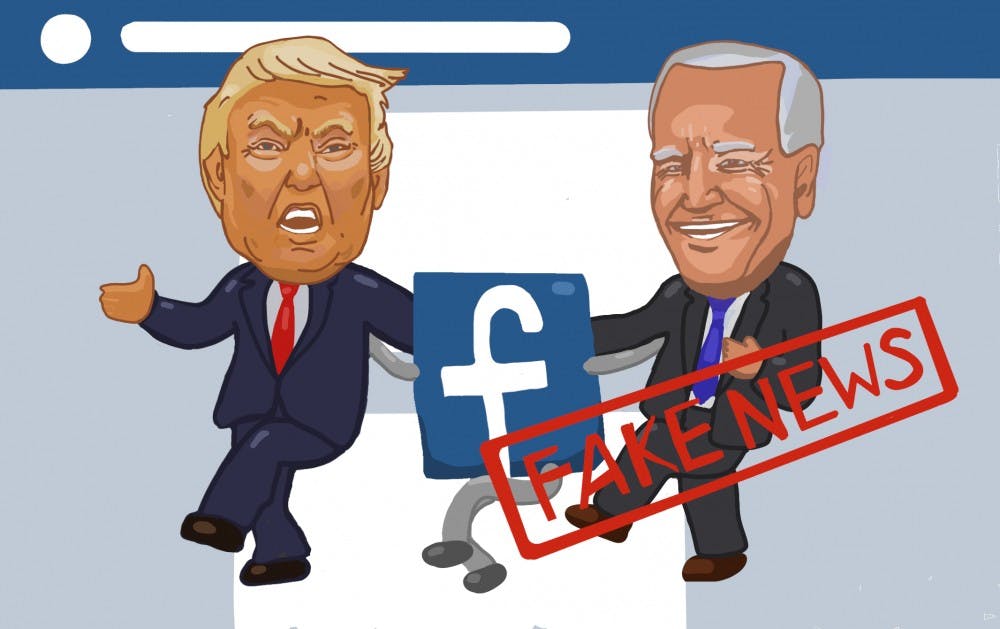"Fake news" is a term that was popularized around the 2016 election, but its meaning is one that is ridden with history. Fake news is just another term for misinformation or propaganda, tools that have been used to fuel hatred and bring readers to publications.
With the rise of social media, fake news has taken on a whole new meaning. Due to the growing nature of the issue, students need to start actively combatting the rise of fake news. This is important now because when the president of the United States is blatantly misinforming the public, it may seem like no specific source can be trusted at face value anymore.
Gina Woodall, a senior lecturer at the School of Politics and Global Studies, teaches a course focused on identifying and refuting fake news.
“What makes it seem so much more salient is because we have this medium, the internet, and we have social media which keeps it at our fingertips. It's everywhere,” Woodall said.
Interestingly for ASU students, approximately one-third of fake news sites were found to be housed in Scottsdale, Arizona due to GoDaddy selling domain names to a number of fake news propagators.
As a generation that spends so much time on social media, students are more likely to be exposed to fake news. Keeping the upcoming election in mind, students must be more vigilant in their understanding of what is really happening in the United States and around the world, instead of just digesting the information in front of them.
In fact, Facebook recently amended its prohibited content policies regarding misinformation, which now exempts “political figures” from having their content banned due to misinformation. This includes political ads and posts that blatantly misinform the public, so long as they are sent from the politician or their campaign.
Unfortunately, this is not just a Facebook policy. It is one that is on other social media platforms as well, including Twitter and YouTube. These social media companies justify allowing politicians to have free reign over what they say online by saying anything these figures say can be considered "newsworthy."
The policies are relevant in the context of the Trump-Biden feud that has fueled the impeachment inquiry. When Trump released a misleading ad regarding Biden and Ukraine, CNN banned the ad for misinformation while other media platforms including Facebook, YouTube and Twitter continued to let it run.
With the lack of policing to decrease public misinformation, students should take fact-checking into their own hands.
“The first thing to do if you find an article is to find the facts of the article. What's the story? And look and see if other outlets are covering it," Woodall said. "After you know that it really happened, look at the details of the article. Are there sources? Are they named? What are they saying about it?”
This process doesn't need to take much time or be strenuous.
“The best thing to do is to go to PBS and NPR to find objective news that is typically just facts,” Woodall said.
Listening to public radio and news are methods I find to be the most fruitful and the easiest to fit into my college schedule. Setting aside just thirty minutes of my day when walking to class or driving to work to listen to unbiased reporting has broadened my world view while also providing me with access to trustworthy news.
It may seem contradictory that in order to fight against fake news we must put trust in reporting. However, the media is the only way for us to get our information. By trusting in public news sources as well as checking the consistencies of stories across a variety of networks, it ensures that students are not being swayed by what politicians want them to believe.
With all the facts in front of them, they can find conviction in their own unique beliefs.
Reach the columnist at alshah2@asu.edu or follow @aasheeni on Twitter.
Editor’s note: The opinions presented in this column are the author’s and do not imply any endorsement from The State Press or its editors.
Want to join the conversation? Send an email to opiniondesk.statepress@gmail.com. Keep letters under 500 words and be sure to include your university affiliation. Anonymity will not be granted.
Like The State Press on Facebook and follow @statepress on Twitter.




